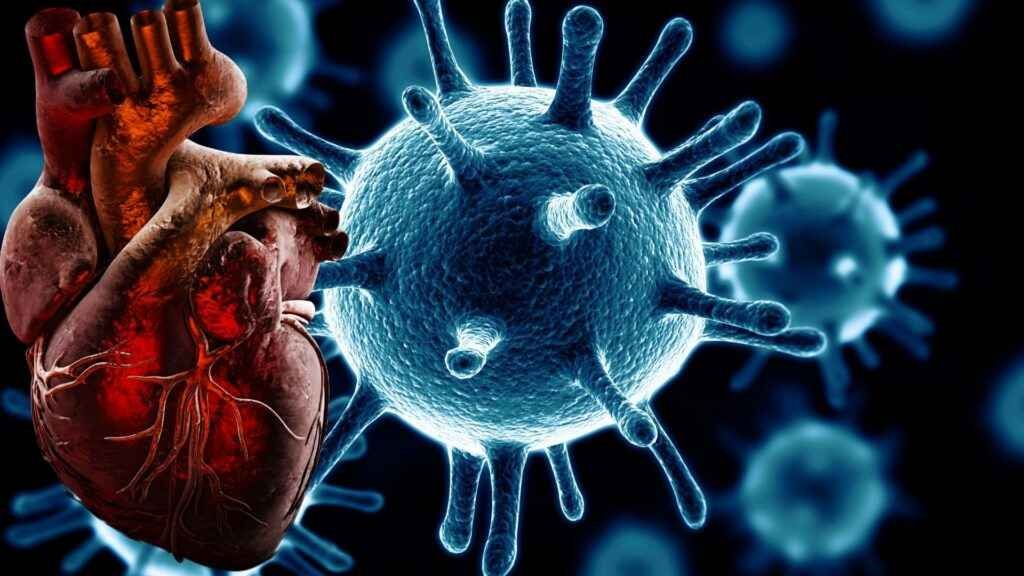Covid 19 and Heart Attack – Can we do something about it ?
Corona virus has significant effects on heart and it is causing heart attacks. The involvement of heart in Covid-19 is evident. 25% of hospitalized Covid-19 patients have symptoms of heart attack. Their markers of heart attack (cardiac troponin levels) at the time of admission is found to be high.
This heart attack is more common among
- elderly patients and
- heart failure conditions,
- coronary artery disease,
- diabetes mellitus, and
- hypertension.
Heart attack in COVID 19 patients is characterized by the requirement for mechanical ventilatory support and higher in-hospital deaths.

COVID 19 and Heart attack relevant statistics –
- Up to 36% patients admitted showed evidence of some heart muscle damage.
- One third of them did not have any prior heart disease.
- The heart attack can happen as let as 14 days after onset of symptoms,
- Around 25% admitted patients showed heart rhythm disturbances due to heart inflammation.
Following are the six ways heart attacks happening in COVID 19 patients –
- Direct viral invasion into the heart muscles,
- More clot formation inside the arteries and veins,
- Classical heart attack (Type 1 Myocardial Infraction)
- Supply-Demand Imbalance (Type 2 MI)
- Death before reaching the hospital (Type 3 MI)
- Heart attack resulting from high Systematic Inflammation
1. Direct viral invasion into the heart muscles
In this mechanism, the virus enters into the heart muscles. A the body builds up immune response to destroy the virus – body also starts destroying heart muscles all together. Thus, heart muscles are damaged.
Direct viral myocardial invasion virus binds with ACE2 through a host protease transmembrane serine 2 to prime the S protein and allow cell entry.
While inside the cell, the virus transforms RNA into polypeptides and an RNA dependant RNA polymerase through host machinery and replicates its RNA. When structural proteins are synthesized and particles assembled, the new virus is formed from the cell by exocytosis.
Host cells may be disabled and destroyed in the process, causing an immune response.
A study of 104 covid-19 patients with acute heart failure and had been put through endomyocardial biopsy revealed that 5 had the SARS-CoV2 virus in the myocardial tissue and is linked to normal characteristics of myocarditis (inflammation of the heart muscle) such as myocardial necrosis, microvascular thrombosis, and intramyocardial inflammation. 61.5% of the patients had symptoms of arrhythmia, myocardial injury, and cardiovascular disease. Cardiac tissue of patients with high myocardium levels expressed the highest pro-inflammatory cytokines; however, the outcomes were not linked to greater inflammatory cell infiltrates.
In individuals affected by covid-19, membrane-bound ACE2 is internalized, resulting in lower receptor density. Myocardial injury is prevalent in covid-19 cases and is linked to poor prognosis.
2. More clot formation inside the arteries and veins –
COVID 19 stimulates the arteries and veins to produce more factors that can cause clotting inside the them. Thus, more it can produce damage those blood vessels supply.
ACE2 is expressed in high levels in the circulatory system and is classified as type 1 MI. Venous and arterial endothelial cells express ACE2 receptors at high levels. Viral replication in local tissues promotes innate immune response causing macrophage activation to the M1 phenotype.
Increased von Willebrand factor levels have been revealed in patients with severe covid-19 infection, indicating ongoing endothelial activation and damage. Histological studies have identified endothelin cases resulting from covid-19 infection.
3. Classical heart attack (Type 1 Myocardial Infraction) –
It happens when atherosclerotic plaque ruptures inside arteries supplying the heart muscles. The heart muscles get damaged and heart attack occurs.
4. Supply-Demand Imbalance (Type 2 MI) –
Myocardial infarction caused by an imbalance between myocardial oxygen supply and demand is described as type 2 MI.
There are four specific mechanisms in the covid-19 situation that are associated with this. They include:
- Fixed coronary atherosclerosis reducing blood & oxygen supply to heart muscles,
- The dysfunction of smaller arteries and veins inside heart muscles,
- Very high blood pressure caused by intense constriction of body’s arteries,
- Lack of oxygen in the blood is caused by acute respiratory distress syndrome or pulmonary vascular thrombosis, basically due to the damage caused to the lung,
5. Death before reaching the hospital (Type 3 MI) –
Many patients avoided hospitals in fear of contacting COVID 19 and thus died at home or in transit more than usual.
Heart attack resulting from high Systematic Inflammation –
Severe inflammation in the whole body has been predicted to be a cause of heart muscle damage in covid-19 patients.
Individuals with sepsis-associated cardiomyopathy have an inflammatory history manifested in high levels of cytokines circulation.
These toxic responses are mediated by calcium channel activity inflection and nitric oxide production, associated with myocardial depression in systematic hyperinflammatory cases such as sepsis.
In a multicentre study in New York’s health care system forms the biggest available study report on myocardial injury. Out of the 2,736 patients included in the study, 36% showed heart attack symptoms at the time of presentation with troponin levels above the normal limit.
Only 30% had a history of coronary artery disease who is found to have heart attacks.
The most frequent symptom in COVID 19 heart attack is chest pain as usual.
The manifestation of myocardial injury seems to happen 14 days after the onset of early symptoms, possibly indicating a more advanced disease stage.
Arrhythmias and abnormal heart rhythms in Covid-19 patients –
- Arrhythmias is a basic manifestation of heart issues in covid-19 patients.
- A clinical study of hospitalized patients in China showed that irregular heartbeats were an initial symptom, with 7.3% of the patients.
- Arrhythmias were recorded in 16.7%, with 44.4% in the ICU.
- A study involving 323 hospitalized patients revealed that 30% of them had arrhythmias. This issue was highly present in the critically ill patients around 96.2% of patients.
How this happens?
This happens primarily due to heart muscle inflammation and injury.
When to take Doctor’s consultation ?
If during or after COVID you feel –
- chest pain for more than 20 minutes ,
- palpitation,
- shortness of breath or
- fainting episodes –
consult your doctor & stay in close follow up. You may need investigations related to heart and blood thinning medicines or injections if necessary. Do not ignore these warning signs.
Healthy Living to Increase Immunity
A person is supposed to be healthy, if he or she has a strong immune system. The entire immune system consists of cells, tissues, muscles, bones, and organs. Together they carry out a bodily process to fight the pathogens that are bacteria, viruses, and foreign bodies that cause disease or infection.
Boosting immunity and reducing inflammation should be the purpose of healthy living – COVID is not damaging the heart or other organs by infecting them but mostly by creating inflammation, a fire inside our system, that our body is unable to extinguish.
When a germ enters your body, it makes you sick and weakens your immune system. A healthy immune system release antibodies that trigger the antigens present on the microorganisms and kill them. So it is important to improve the immune system to get a healthy body and maintain a healthy lifestyle. But how it is possible?
Let us know the process to boost your immune system.
How can you boost your Immune System and reduce inflammation in the body?
The most convenient way to boost your immune system is to eat healthy food and dietary supplements. To work well, your immune system requires harmony and balance which is only possible by eating a balanced diet, healthy food supplements, doing exercises, avoid psychological stress and many other factors. Healthy living strategies help to function the body’s immune system and show proven health benefits.
Every part of the human body including the immune system functions well when it is protected from environmental or external assaults and get strengthen by healthy living ideas such as:
- Minimizing stress
- Get enough sleep
- Do not smoke
- Eat balanced diet food, full of vegetables and fruits
- Exercise regularly
- Maintaining standard body weight
- Not consuming alcohol
- Try to avoid infections by washing your hands frequently and washing raw vegetables, fruits, meats, etc thoroughly
- Checking all recommended vaccines. Vaccines improve your immune system to fight against infections before the capture your whole body.
Healthy Diet for a better Immune System
Like any fighting army, a healthy immune system stands as a warrior against infections and diseases. Researches had stated that some dietary factors such as sugar intake, processed foods, packed foods, roadside eatables, etc adversely affect the immune function.
Scientists and doctors suggest taking low-carb diets to control blood pressure and sugar.
Regular consumption of fruits like
- apple,
- banana,
- guava,
- orange, etc and
vegetables like –
- mushrooms,
- bell pepper,
- green vegetables,
- tomato, etc
– build the resilience of the body to fight against infections as they are rich in ascorbic acid, beta carotene, essential vitamins, and minerals.
Fermented food and probiotics activate the gut bacteria to absorb nutrients from the body.
Daily intake of food supplements like Omega 3, Omega 6 fatty acids; Natural immunity supplements such as, ginger turmeric, amla, garlic, black cumin, basil leaves; seeds and nuts like flaxseed, pumpkin seeds, sunflower seeds; provide protein and vitamin E to the body that highly boosts your immune function.
Stay Hydrated
Drinking water up to 3 litres every day will help you to stay hydrated. Other alternatives such as citrus food, coconut water, juices, shakes, etc help to beat the heat. Hydration will decrease the chances of flu and will flush out toxins from the body. Removal of toxins and impurities from the body will make a stronger immune system.
Enough sleep
Sleeping 7 to 8 hours a day will help you to increase your body’s immune power. Lack of sleep will leave you tired, affect other bodily functions and harm your brain activity which will directly affect your immune system. Less sleep will lead to dysfunction of the flu vaccine.
Regular exercise
A good diet along with an exercise routine releases toxins from your body.
It is recommended to perform light or heavy exercises or work out for 45 minutes to 1 hour depending on your stamina.
Regular exercise helps in improving metabolism that will correlatively improve the immunity of the body. If you have less knowledge about exercises or workouts then this is the best time to start. Go through several mobile applications, videos, youtube channels, and blogs that will help you to learn various exercises and workouts according to your body type and health.
Relax Your Body and Mind
Stress harm your immune system. Working for too long, staying indoors or outdoors for a prolonged period, consuming addictive substances, doing unnecessary traveling, etc may affect your mental stress and body.
Avoid intake of addictive substances
Bad habits like smoking, alcohol consumption, drug intake will weaken your body parts and respiratory system which will ultimately lead to the weakening of the immune system. Avoid and practice moderate intake of such substances which will help you to repair your body cells and build your immune system.
Meditation and yoga
Too much stress releases cortisol hormone that makes you feel anxious, thus making a way for infections to attack your body.
The best way to release stress is through yoga and meditation which will calm your nerves and brain.
Practicing yoga, meditation, and light exercises daily needs to improve your immune system and make you stay healthy.
Traveling
Avoid unnecessary traveling as you may come in contact with infections and pathogens that will affect your body. In case you are traveling make sure to cover your mouth and nose with a mask, sanitize your hand with an alcohol-based hand sanitizer, use shades to cover your eyes from dirt or dust, and avoid accessing things or places frequently used by many people.
Follow a Healthy Lifestyle
Apart from doing regular exercises, drinking enough water, taking enough sleep, and consuming balanced diet food, it is also important to maintain a healthy lifestyle which proper supplements and nutrients that act as a preventive measure to fight against diseases.
● Practice meditation, pranayama and yoga asanas.
● Drink warm water, honey, and lemon juice everyday early morning.
● Drink herbal tea; avoid milk tea and coffee
● Increase the intake of fruits vegetables, eggs, turmeric, garlic coriander, etc.
● Avoid sugar; use dates & honey instead, if you are craving to eat sweets.
● Use homemade or original coconut oil, mustard oil, ghee, etc during cooking.
Final Thoughts :-
COVID 19 is a new challenge to our immune system. The virus can cause out of proportion of inflammation through out the body. This inflammation can damage our heart muscles by different mechanisms those I have already discussed. As a result, people can have heart attack due to the viral infection even after 14 days of symptoms. One third of these patients may not have any history of heart disease earlier. The severe the COVID – the more probability of heart attack it gives rise to.
Remember, Boosting immunity and reducing inflammation should be the purpose of healthy living – COVID is not damaging the heart or other organs by infecting them but mostly by creating an inflammation, a fire in our system, that our body is unable to extinguish.
Always remember that the immune system is a vital as it helps reducing the inflammation in the body, yet complex system of the body. Eating balanced diet food and adopting other lifestyle factors will increase the immune system’s ability to fight against infections.
If you have any heart symptoms as I have discussed earlier – go ahead and consult your physician. Early investigations and few medicines can really do miracles at the initial stage.
Start this above prevention basics and read the important tips and techniques so that you can improve your immunity to enjoy a healthy living.





